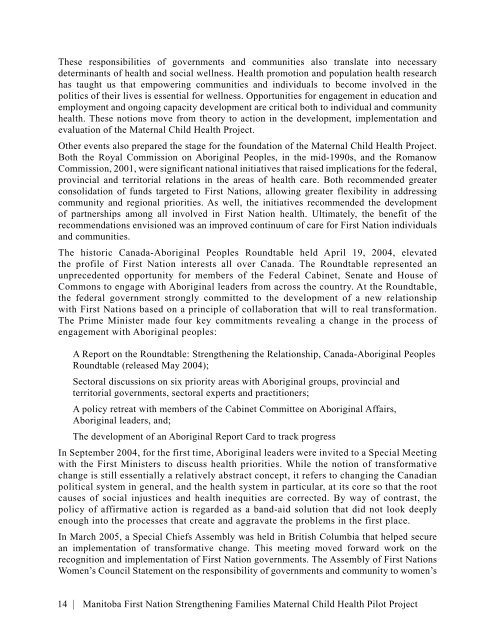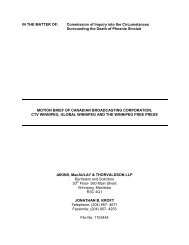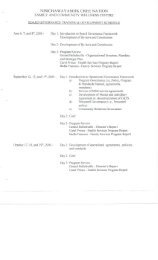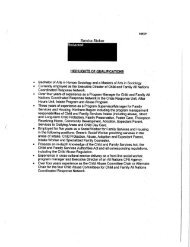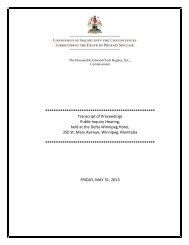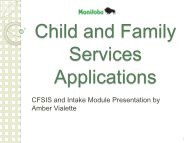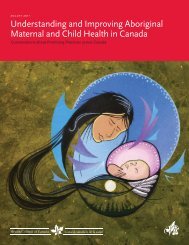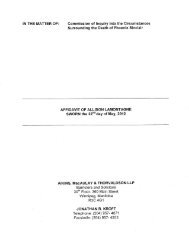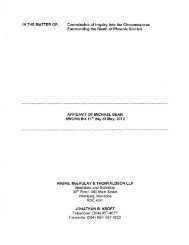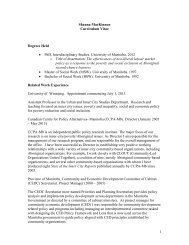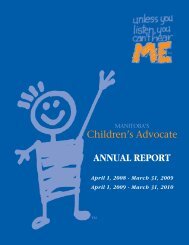Untitled - Phoenix Sinclair Inquiry
Untitled - Phoenix Sinclair Inquiry
Untitled - Phoenix Sinclair Inquiry
Create successful ePaper yourself
Turn your PDF publications into a flip-book with our unique Google optimized e-Paper software.
These responsibilities of governments and communities also translate into necessary<br />
determinants of health and social wellness. Health promotion and population health research<br />
has taught us that empowering communities and individuals to become involved in the<br />
politics of their lives is essential for wellness. Opportunities for engagement in education and<br />
employment and ongoing capacity development are critical both to individual and community<br />
health. These notions move from theory to action in the development, implementation and<br />
evaluation of the Maternal Child Health Project.<br />
Other events also prepared the stage for the foundation of the Maternal Child Health Project.<br />
Both the Royal Commission on Aboriginal Peoples, in the mid-1990s, and the Romanow<br />
Commission, 2001, were significant national initiatives that raised implications for the federal,<br />
provincial and territorial relations in the areas of health care. Both recommended greater<br />
consolidation of funds targeted to First Nations, allowing greater flexibility in addressing<br />
community and regional priorities. As well, the initiatives recommended the development<br />
of partnerships among all involved in First Nation health. Ultimately, the benefit of the<br />
recommendations envisioned was an improved continuum of care for First Nation individuals<br />
and communities.<br />
The historic Canada-Aboriginal Peoples Roundtable held April 19, 2004, elevated<br />
the profile of First Nation interests all over Canada. The Roundtable represented an<br />
unprecedented opportunity for members of the Federal Cabinet, Senate and House of<br />
Commons to engage with Aboriginal leaders from across the country. At the Roundtable,<br />
the federal government strongly committed to the development of a new relationship<br />
with First Nations based on a principle of collaboration that will to real transformation.<br />
The Prime Minister made four key commitments revealing a change in the process of<br />
engagement with Aboriginal peoples:<br />
A Report on the Roundtable: Strengthening the Relationship, Canada-Aboriginal Peoples<br />
Roundtable (released May 2004);<br />
Sectoral discussions on six priority areas with Aboriginal groups, provincial and<br />
territorial governments, sectoral experts and practitioners;<br />
A policy retreat with members of the Cabinet Committee on Aboriginal Affairs,<br />
Aboriginal leaders, and;<br />
The development of an Aboriginal Report Card to track progress<br />
In September 2004, for the first time, Aboriginal leaders were invited to a Special Meeting<br />
with the First Ministers to discuss health priorities. While the notion of transformative<br />
change is still essentially a relatively abstract concept, it refers to changing the Canadian<br />
political system in general, and the health system in particular, at its core so that the root<br />
causes of social injustices and health inequities are corrected. By way of contrast, the<br />
policy of affirmative action is regarded as a band-aid solution that did not look deeply<br />
enough into the processes that create and aggravate the problems in the first place.<br />
In March 2005, a Special Chiefs Assembly was held in British Columbia that helped secure<br />
an implementation of transformative change. This meeting moved forward work on the<br />
recognition and implementation of First Nation governments. The Assembly of First Nations<br />
Women’s Council Statement on the responsibility of governments and community to women’s<br />
14 | Manitoba First Nation Strengthening Families Maternal Child Health Pilot Project


